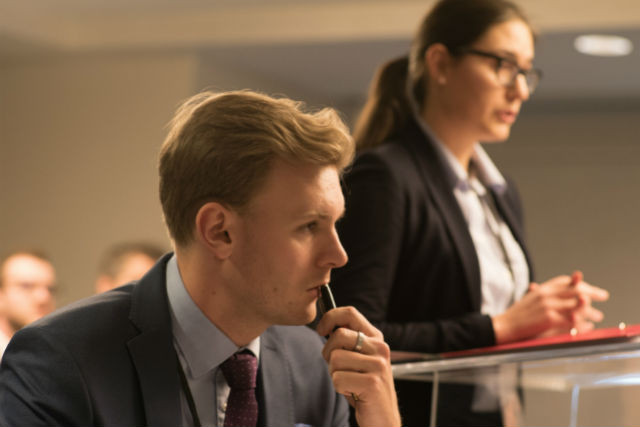Jess Bauldry: Who are you, where are you from and what got you into moot courts?
Johannes Hendrik Fahner: My name is Johannes Hendrik Fahner and I am a PhD candidate in public international law at the University of Luxembourg. Every year, our university participates in a significant number of moot courts in different fields of law. Moot courts are pleading competitions in which students enact a fictional legal dispute before a court or tribunal. During the competition, students represent one of the parties in the dispute, which means they have to draft written arguments and plead before judges.
Over the past years, I have coached the university’s team participating in the Jessup International Law Moot Court Competition, the oldest and largest moot court in international law, named after Philip C. Jessup, former American Judge at the International Court of Justice. More than one hundred teams from all over the world participate in this competition in Washington, DC.
Tjaša Perger: I am Tjaša Perger and I come from Slovenia. I did my bachelor in law at the University of Ljubljana, where I also got my first experience of different moot courts. What always motivated me was the opportunity to get practical experience in drafting memorials and obtaining skills in oral advocacy. Moreover, moot courts offer an amazing opportunity to travel and get to know interesting people from all around the world.
JB: Can you briefly describe your first moot court experience? How did it go?
TP: The first time being part of a team and working on one legal problem for over 4 months was challenging in many ways. First, there is the thrill of reading the problem and finding the main arguments. Then there is a phase of thorough research where sometimes I got the feeling there is nothing more to find and finally the draft is done. The last days before submitting written memorials are most stressful, as the team must finalise everything--from arguments to formatting (where index of authorities and footnotes test all your patience). And at the end you always find several points, which could still be improved.

Photo: Johannes Hendrik Fahner. The moot court team from the University of Luxembourg pose for a photo at the contest in Washington DC
JB: The fictitious Jessup case sounds rather thrilling. How close to reality do the moot cases tend to be?
TP: Usually the cases resemble the most actual problems and dilemmas in that particular field of law. This year’s Jessup problem reflected the question of procedural irregularities during arbitration, the capture of the underwater drone, the existence of disarmament obligations, the attack on a ship located on high seas and the capture of nuclear powered submarine. All these questions somehow reflect reality, for example the question of validity of arbitration between Croatia and Slovenia and the capture of United States underwater drone in [the] South China Sea. As such these issues all exist but are not yet clear under international public law. The fun part is always made up names of the countries, which are hard to pronounce.
JHF: The Jessup competition imitates a dispute before the International Court of Justice (in The Hague. This year’s case included a variety of contested issues, such the legality of the acquisition or possession of nuclear weapons. This question was brought before the real ICJ in the 1990s, but in that case the court gave a rather ambiguous opinion. Recently, similar questions were again raised in a case brought by the Marshall Islands against Great Britain, India and Pakistan, but that complaint was rejected by the court in 2016, without consideration of the merits. This shows that the legality of nuclear arms under international law is extremely controversial and therefore a great topic for a moot court competition.
JB: Your team participated in the international rounds of the competition in Washington DC. How did it go?
JHF: Our team pleaded four times in Washington. We won two matches, against teams from the Czech Republic and Lebanon. Unfortunately, we lost against Columbia Law School and the University of Indonesia, which meant we could not advance to the subsequent round. The competition was won by the University of Queensland, Australia.
